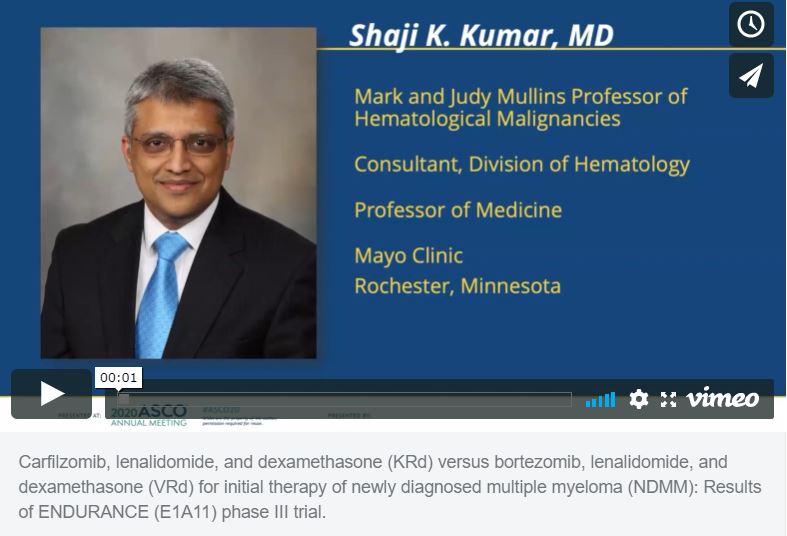PIK3CA is one of the most frequently mutated genes in breast cancer and a negative prognostic factor in HR-positive, HER2-negative advanced breast cancer. Approximately 40% of patients with this disease have a mutation of the PIK3CA gene in their tumour [1]. Alpelisib – an alpha-selective PI3 kinase inhibitor – plus fulvestrant recently demonstrated efficacy in the phase 3 SOLAR-1 trial in patients with HR-positive PIK3CA-mutant advanced breast cancer progressing on an aromatase inhibitor, nearly doubling the median progression-free survival (PFS) from 5.7 months in the placebo arm to 11 months in the alpelisib arm (HR 0.65; 95% CI 0.50-0.85; P<0.001) [2].
The current standard-of-care in first-line setting for patients with HR-positive advanced breast cancer is (in many countries) endocrine therapy with a CDK4/6 inhibitor. However, resistance develops over time in almost all patients. In SOLAR-1, 20 patients had previously progressed on CDK4/6 inhibitors. In this small cohort, median PFS in the alpelisib plus fulvestrant-treated arm was also prolonged compared with the placebo arm (5.5 vs 1.8 months; HR 0.48; 95% CI 0.17-1.36) [2].
The phase 2, open-label, non-comparative BYLieve trial is the first prospective trial that evaluated alpelisib and endocrine therapy with either fulvestrant or letrozole in 3 cohorts of patients with PIK3CA-mutated HR-positive advanced disease who had progressed on or after therapy with a CDK4/6 inhibitor [3]. Primary endpoint of the study was the proportion of patients alive without progression of disease at 6 months (RECIST v1.1). Secondary endpoints included PFS, overall survival (OS), objective response rate (ORR), and safety. In cohort A, 127 patients with prior CDK4/6 and aromatase inhibition were enrolled and subsequently treated with alpelisib (300 mg once daily) and fulvestrant (500 mg).
After 6 months of follow-up, 50.4% of patients were alive without disease progression, median PFS was 7.3 months. For comparison, in SOLAR-1, PFS at 6 months was 44.4%. ORR was 17.4%, all responses were partial. Treatment-related adverse events grade ≥3 were observed in 66.9% of patients; adverse events leading to dose reduction or interruption in 53.5% and adverse events leading to discontinuation of treatment in 11.8%. The most frequent all-grade adverse events reported were diarrhoea and hyperglycaemia. Rash was reported in 28% of patients; 10 of 127 patients received antihistamines before developing a rash or had no rash events.
- Mosele F, et al. Ann Oncol. 2020; 31: 377-386.
- André F, et al. N Engl J Med 2019; 380:1929-1940.
- Rugo HS, et al. ASCO Virtual Meeting, 29-31 May 2020, Abstract 1006.
Posted on
Previous Article
« Strategies emerge for chemotherapy de-escalation in HER2-positive breast cancer Next Article
PHOEBE, a phase 3 trial comparing pyrotinib and lapatinib in HER2-positive metastatic breast cancer »
« Strategies emerge for chemotherapy de-escalation in HER2-positive breast cancer Next Article
PHOEBE, a phase 3 trial comparing pyrotinib and lapatinib in HER2-positive metastatic breast cancer »
Table of Contents: ASCO 2020
Featured articles
COVID-19 & Telemedicine
COVID-19 and Cancer Consortium Registry: initial results
Oncology hospital-at-home model reduces hospitalizations, emergency department visits, and costs
Nurse-led telephone triage system reduces hospitalizations, helps patients manage symptoms at home
Melanoma
Adjuvant pembrolizumab: durable RFS for stage III melanoma
Adjuvant pembrolizumab: durable RFS for stage III melanoma
Pembrolizumab plus low-dose ipilimumab well tolerated after progression on PD1 antibody therapy
Toripalimab plus axitinib effective in metastatic mucosal melanoma
Breast & Ovarian Cancer
Advanced breast cancer: locoregional therapy does not improve OS
T-DM1 does not improve safety or efficacy in HER-2 positive early breast cancer; favorable iDFS reported
Maintenance olaparib improves OS in relapsed ovarian cancer with BRCA1/2 mutation
Combination pembrolizumab/chemo improves PFS in metastatic TNBC
Effect of veliparib with or without cisplatin in breast cancer: results of SWOG S1416
PHOEBE, a phase 3 trial comparing pyrotinib and lapatinib in HER2-positive metastatic breast cancer
BYLieve demonstrates efficacy of PIK3CA-directed treatment post CDK4/6-ihibition
Strategies emerge for chemotherapy de-escalation in HER2-positive breast cancer
Multiple Myeloma
Carfilzomib: no PFS benefit for multiple myeloma
Lung Cancer
ES-SCLC: tremelimumab + durvalumab + chemotherapy misses endpoint
Adjuvant osimertinib in NSCLC: practice changing ADAURA trial
ES-SCLC: pembrolizumab KEYNOTE-604 data
Second-line gemcitabine plus ramucirumab significantly improves overall survival
Tiragolumab and atezolizumab: ORR in NSCLC
MET-amplified advanced NSCLC responds well to MET inhibitor capmatinib
Genitourinary Cancer
Urothelial cancer: avelumab works as maintenance therapy
ARAMIS final OS and nmCRPC safety outcomes
Final survival results from phase 3 SPARTAN trial
Novel drug for kidney cancers/VHL patients
Primary analysis from IMvigor010, adjuvant atezolizumab in high risk muscle-invasive urothelial carcinoma
First randomised trial of Lu-PSMA in mCRPC progressing after docetaxel
Gastrointestinal Cancer
HER2-expressing metastatic colorectal cancer: trastuzumab deruxtecan
REGOMUNE: a phase 2 study combining regorafenib and avelumab
Cardiotoxicity: consider switching to S-1
Perioperative chemotherapy for resectable pancreatic ductal adenocarcinoma
Real-world data of sequential sorafenib followed by regorafenib in unresectable HCC
Paediatric Cancer
Sustained improvements in quality of life with larotrectinib
Promising first immunotherapy trial in placental trophoblastic tumours
Precision medicine for poor-prognosis paediatric patients
Related Articles

August 28, 2020
Carfilzomib: no PFS benefit for multiple myeloma

September 17, 2020
Urothelial cancer: avelumab works as maintenance therapy
September 17, 2020
First randomised trial of Lu-PSMA in mCRPC progressing after docetaxel
© 2024 Medicom Medical Publishers. All rights reserved. Terms and Conditions | Privacy Policy
HEAD OFFICE
Laarderhoogtweg 25
1101 EB Amsterdam
The Netherlands
T: +31 85 4012 560
E: publishers@medicom-publishers.com

